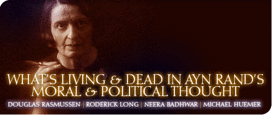Doug’s initial essay raised a number of questions. For the most part, we’ve been focusing on just one subset of them: those having to do with Rand’s attempt to argue from biological teleology to Aristotelian egoism to individual rights and the harmony of interests. In my initial post I did try to address one of Doug’s questions about Rand’s conception of capitalism, but no one really took the bait. (Well, no one here. Bryan Caplan replied elsewhere; see my response in the talkback.)
But Doug raised still other issues that none of us has addressed — including the question of whether Rand’s complete rejection of religion is defensible. As our discussion winds down, I thought it might be worth asking whether we want to say anything about those further issues, and in particular religion.
Let me approach the issue of religion from a somewhat odd angle.
Rand says somewhere in her letters or journals that she would not object so much to a conception of God that made him just one more thing among others in the universe; that would leave him open to rational investigation, and in particular would avoid the need to see God as the creator of the universe (which in her view would incoherently make existence dependent on consciousness). It is particularly the notion of a transcendent God that she objects to.
For many believers, of course, Rand will seem to have gotten things simply reversed. A God who was just one more being among others would hardly seem worthy of worship; his distance from a clay idol would be too small, and to worship him would be degrading and unseemly. Without transcendence, we have no God worth talking about.
I share the reaction that any God worthy of the name would need to be more than just one another denizen of the universe. But I also agree with Rand that nothing should be beyond rational investigation, as well as that the notion of consciousness creating existence is incoherent. So does that leave any room for a transcendent object of worship?
Maybe. There is a long tradition of identifying God not with a subjective personality but with something more like an ontological-moral principle, or even the logical structure of the universe itself. We find this idea in Plato’s Form of the Good, in the Stoics’ identification of God with Reason or the Scholastics’ identification of God with Being, and perhaps even in God’s Biblical self-identification as “I AM WHO AM.” Thinking of God as the logical structure of the universe rather than as one more chunk of reality within that structure would yield the transcendence the believer desires, but it wouldn’t place God beyond rational inquiry (what could be more open to reason than Reason itself?), nor would it make God a personal creator. The notion of worshiping a principle may also seem less offensive to human dignity than that of worshiping a person. (Of course, insofar as the logical structure of the universe is something atheists can believe in too, the line between theism and atheism would thereby be blurred.)
But is there room for such a conception of God in Rand’s ontology? Probably not. For a Platonist, the realm of logic is a feature of reality itself, external to the human mind, and so is a potential candidate for Godhood; but for Rand, logic is a tool of the human mind with which to grasp reality, and the constructs of logic, such as universals, have a merely epistemological status rather than a metaphysical one. Hence worshiping logic would simply be worshiping the contents of one’s own mind — an unpromising (though not unprecedented) basis for theism.
My own (Wittgenstein-influenced) view, however, is that logic is neither a tool we bring to reality à la Rand nor an extramental feature to which our minds must bow à la Plato; it’s much more pervasive than that. It’s not located in our mind, or in the Forms, or in physical objects, or in our mind’s relation to physical objects; it’s not located, period. It’s the background presupposition of all thought and all reality; and there’s nothing we can (without resorting to metaphor) say about it over and above what we can say with and through it. Hence it is, in a certain sense, indescribable, even though it is the most intelligible thing there is. If this sounds like mysticism, it’s the mysticism of reason rather than the mysticism of unreason. (I talk about these issues more in “Theism and Atheism Reconciled,” “The Unspeakable Logos,” “Satanic Epistemology?,” and “The Very Idea.”)
In saying these things about logic, and identifying God with logic so conceived, do we rescue the concept of God, and indeed raise it to the highest transcendence conceivable? Or do we instead etherealize God into nothingness?

